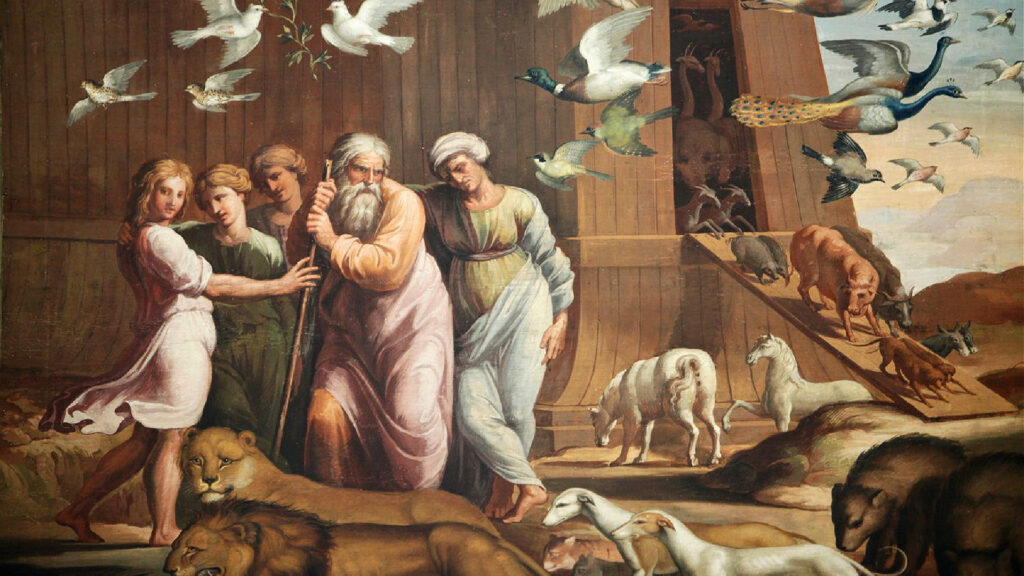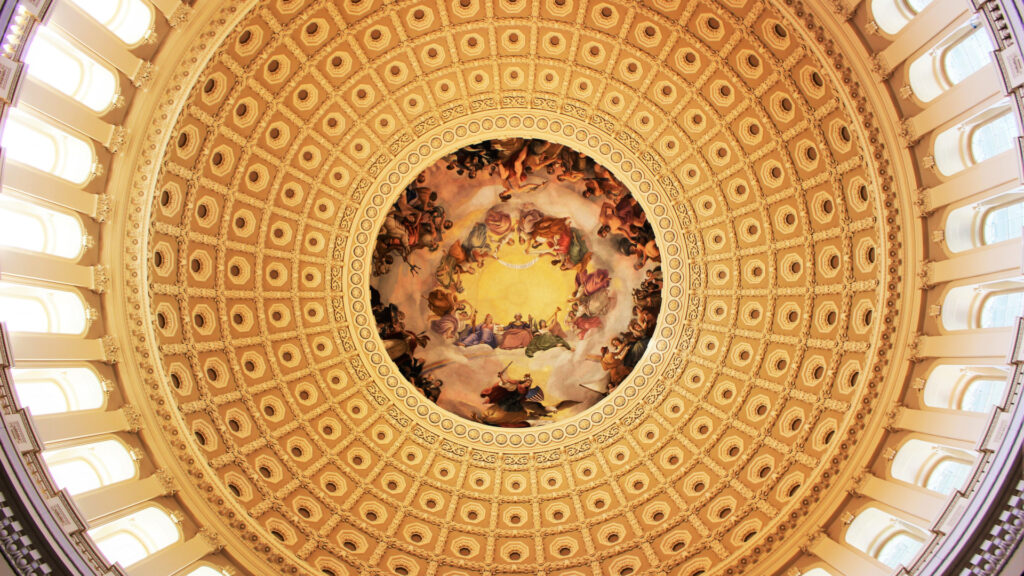Posts by reachchurch
God Remembers
Read This Week: Genesis 8
But God remembered Noah and all the wild animals and livestock with him in the ark, and he sent a wind over the earth, and the waters receded. By the first day of the first month of Noah’s six hundred and first year, the water had dried up from the earth. Then Noah built an altar to the Lord, and God smelled the pleasing aroma and said in his heart: “Never again will I curse the ground because of humans, even though every inclination of the human heart is evil from childhood. – Genesis 8: 1, 13 & 20-21
In chapter 8, the flood ends because God decides that his will has been accomplished through it. His sovereignty and power are seen again just as in creation as the rain stops and the vast and catastrophic waters covering the whole planet begin to recede. The Bible says that the water steadily went down over a period of time until the tops of the mountains became visible (v.5), and it dried up from the earth (v.13). Verse 14 offers an emphatic stopping point to this natural disaster when it simply states that the earth was completely dry. It was a new day for Noah and his family, the people God chose to reset the human race.
If you have been following along with this story, you want to take a deep breath at this point. It has been an intense narrative from when the Lord called out the wickedness of humanity and decided to flood the earth. The tension is thick throughout the ark construction and the build-up to Noah boarding the boat with the animals. Then, it is further gripping and dramatic as they endure the rising of the waters and the relentless downpours while knowing what is happening to those left behind. The scene of the ark resting on Mt. Ararat as the water retreats is a solace and a metaphor for the calm after the storm. It is a comforting illustration that God remembers us even when we may feel like He is not there.
Verse 1 says that God remembered Noah. The word remembered here does not imply that God had previously forgotten about Noah. It is the Hebrew word zāḵar, which means to be reminded of or to think of one again. The Lord had sustained and preserved Noah, his family, and all of the animals during the flood, but here, He thinks of them again as those with whom He will make His covenant. They are brought to His mind because of His love for them, His grace for them, and His plan for their future. In Verses 16-17, God tells them to come out of the ark, you and your wife and your sons and their wives. Bring out every living creature so they can multiply on the earth and be fruitful. This moment illustrates the Lord’s enduring heart for us. He remembers.
God remembers us when we stray and don’t always act according to his will for our lives. He remembers when we’re obedient to His word and faithful to what He asks us to do. He remembers when we’re hurting and longing for relief, understanding, and comfort. He remembers when we’re exhausted with life, feeling defeated and unsure where to turn next. He remembers when things are going well, and the blessings are abundant. He remembers us in our successes and losses and at our highest and lowest moments. He is always abounding, and He responds to us with His truth, love, kindness, and mercy. He remembers, and we worship Him as we live in His promises just like Noah did (v. 20-21).
In This Generation
Read This Week: Genesis 7
The Lord told Noah, “Go into the ark, you and your whole family, because I have found you righteous in this generation.” And Noah did all that the Lord commanded him. – Genesis 7:1, 5 NIV
We know the spiritual ramifications of the flood from the last chapter, but it was such a cataclysmic event in human history. It altered the landscape of the earth and the nature of the habitat. It modified the geological constructs of the earth’s terrain and catalyzed the formation of the world’s most impressive mountains, canyons, and valleys. It is even debated whether the water erosion significantly formed the mighty Himalayan mountain range or whether it rose out of the ocean depths when the water came upward. It also impacted the ecosystem in such a way that the life span of human beings significantly dropped. It changed everything.
The flood was a generational event for all time. It affected everyone who came after it. A generational event of such magnitude requires generational circumstances and measures carried out by a generational person. Genesis 7 unpacks the coming of rain and the destruction brought to the world by water. Noah, the man found righteous in this generation, takes instructions from God to build a very large boat or ark to contain a small group of people and a massive number of animals. The ark was approximately 510 feet long and more than 50 feet high, and it had the same capacity as about 450 modern semi-trailers. It was a generational boat and served a physical and spiritual purpose in the story of God. It was the vessel of life, promise, and renewal.
This chapter begins after Noah has completed the ark and is commanded by God to board. He does not go alone. God allows him to take his wife, three sons, and their wives. Noah is also to bring all the animals that God is sending to him so they can be saved. Including the animals on the ark is an often overlooked act of compassion that God shows toward his creation and the things He has made. It reveals the fatherly nature of his character to spare animals in the flood so that they don’t have to suffer. Even in his righteous judgment, God demonstrates tenderness and mercy. He does the same for us in this generation. In spite of the same prevalent nature of devastating sin and his holy right to judge it, God’s grace is expressed through salvation in Christ, and his kindness is seen in the blessings he gives us to enjoy our lives and his creation.
After they are secure and on the boat, the Bible says in verses 11-12 that all the springs of the great deep burst forth, and the floodgates of the heavens were opened. And the rain fell on the earth forty days and forty nights. The text here is almost prosaic in the way it describes the event. The language is poetic, but the truth of it is devastating chaos and destruction. Nothing is lyrical about the earth being destroyed and people perishing in the rising and rushing waters. This diluvian event had a comprehensive impact as the waters are said to have prevailed over all the earth, including the highest summits of the highest mountain. A total picture of ruin.
One cannot help but be moved and overwhelmed by the account of the flood. It is too intense and implicative of too much to not be touched by. It is an occurrence for the ages, and thankfully, God found one man and his family who were up to ask to meet it with His help. People who were found righteous in their generation. We have the same opportunity with the power of the Holy Spirit. We live in crucial times of history. We are witnessing events and circumstances unprecedented in the annals of our society. We have the chance to be found righteous in this generation and be used by God to accomplish great things in the face of disastrous and ruinous events. Like Noah, the Lord can use us to extract His glory from seemingly dreadful conditions.
Except for Noah
Read This Week: Genesis 6
The Lord saw how great the wickedness of the human race had become and that every inclination of the thoughts of the human heart was only evil all the time. The Lord regretted that he had made human beings on the earth, and his heart was deeply troubled. But Noah found favor in the eyes of the Lord. – Genesis 6:5-8 NIV
The words of verses 5 and 6 in Genesis 6 are devastating and haunting. After civilizations began to form and humanity multiplied and spread on earth, God’s assessment when He looks at it all is regret at ever creating human beings. Think about that for a moment. After reading through the glorious process of creation of the universe and seeing how God breathed the breath of life into man and woman, it is sad and gut-wrenching to see people’s behavior at such a point that the Lord wishes He had never made them. How crushing to absorb.
This passage tells us that God is not without reason or justification for His feelings. It describes the depth of man’s depravity just 1,000 years after the fall as sadistic and wicked. The latter part of verse 5 comments that every inclination of the thoughts of the human heart was only evil all the time. There was a wholistic nature to man’s wickedness at that time. In no uncertain terms, the writer of Genesis tells us that human beings are corrupt and sinful to the core and that there is no break in their evil thoughts and wrongdoing. The people of that day were literally always up to no good. God saw this and His heart was deeply troubled.
Yet, there is hope. Just as we saw in the last chapter, humanity, sinful and broken as we may be, is still made in the image of God and is, with His help and faithfulness, capable of living for His glory, purposes, and mission. That hope and aspiration of human beings comes in the beginning of verse 8 and starts with the simple conjunction but which means except for. It says, But Noah found favor in the eyes of the Lord. The world was inexorably lost to its own devices, with the exception of Noah, except for one man and his family.
Except for Noah, there was all this rampant wickedness and depravity on earth. Except for Noah, people were not faithful to God and His ways. Except for Noah, human beings were devious, self-interested, violent, and barely experienced a moment where their hearts were not full of malice. God would have been content to wipe out the human race except for Noah. Verse 9 says Noah was a righteous man, blameless among the people of his time, and he walked faithfully with God. That was his witness, his life, and how He found favor with the Lord to be chosen to restart humanity on earth.
Amid his current culture, Noah was counter-cultural. In the middle of widespread moral and societal decay, Noah was upstanding. The Bible says he was righteous, which means he was both holy and ethical. He was spiritual and virtuous. It asserts that he was blameless, whole, and complete in his commitment to his relationship with God and others. And the verse also informs us that He had an ongoing, vital fellowship with God as he walked faithfully with. This testimony is why the Creator told Noah that He would destroy the earth but spare him and his family indicating the power and impact of a life lived for God in any era or generation.
Genesis 6 should be sobering to us but also inspirational and hopeful that we can live a life with God that makes a lasting and eternal difference on earth. Maybe a good exercise for all of us to do is insert our name into this sentence and then finish it: Except for ____________, the world is… It may stir us to think about how we’re different than the world. It may challenge us to examine our lives and see if we’re more like the culture or Noah. Or better yet, more like Jesus.
Reflection
Read This Week: Genesis 5
When God created mankind, he made them in the likeness of God. He created them male and female and blessed them. And he named them “Mankind” when they were created. When Adam had lived 130 years, he had a son in his own likeness, in his own image, and he named him Seth. After Seth was born, Adam lived 800 years and had other sons and daughters. Altogether, Adam lived a total of 930 years. – Genesis 5:1-5 NIV
So much is made about the likeness and image of God in the first four chapters of Genesis, and rightly so. It is crucial to understand how God fashioned and made us and how He imparted his essence to us as created beings. We must comprehend that we have inherent worth and significance as individuals and as a collective people simply because we are image-bearers of the Creator. Being created by God is more than enough to ascribe value and importance to us. His meticulous craftsmanship and forethought involved in our design impute an eternal worth and preciousness to us that…
It is equally critical to understand that the image of God woven into the formation of human beings was not lost in the fall. The sin that marred the perfect situation for human beings and established a separation between us and God did not ultimately change the fact that we are still made in His image and represent his most prized creation. Verse 1 of chapter 5 reiterates this when it says God created mankind, and he made them in the likeness of God. This assertion comes after the fall of man, indicating that even though we are not perfect and are in need of a Savior, we are still formed in His likeness.
Verse 3 makes it clear that even after sin greatly affected his family, Adam had a son in his own likeness, in his own image, and he named him Seth. Adam’s image was still in the likeness of God, and it was passed down to his descendants despite their brokenness, just as it is passed down to us. The disobedience of the fall and subsequent sinful, treacherous, and violent acts did not overtake or put an end to God’s image in the world.
In fact, there were people on earth like Enoch (v. 21-24) who walked faithfully with God for 300 years and had other sons and daughters (v.22). Enoch was a reflection of God’s image to the world along with his family. He brought glory to the Lord with his lifestyle, decisions, and behavior over a very long period of time. This chapter tells us that Enoch lived a total of 365 years and was so close to God as an image-bearer that he was no more because God took him away (v.24). He was so faithful in his relationship with God that he didn’t even die. The Lord just ushered him into heaven one day without dying.
It has been said that Enoch’s obituary would have gone something like this: Enoch passed away, or so we think because he just wasn’t here one day. His family survives him and what can be said for his life is that he was a man of faith who walked with and pleased God. There are no funeral arrangements. Hebrews 11:5 says, by faith, Enoch was taken from this life, so that he did not experience death: “He could not be found, because God had taken him away.” Before he was taken, he was commended as one who pleased God. May we all have such an obituary and legacy.
Even after sin entered the world and wrecked God’s original intent, His image is still seen in human beings. His presence and mark on us are still evident today. Through Christ and the Holy Spirit, we can be like Enoch and live as a reflection of the Father’s heart amid rampant evil. We can reflect his goodness, love, mercy, and kindness. We can reflect His desire to see people know Him and carry the good news to others. We can live in such a way that those we encounter are attracted to God because we are a reflection of His glory.
Inside Out
Read This Week: Genesis 4
Eve became pregnant and gave birth to Cain. She said, “With the help of the Lord, I have brought forth a man.” Later, she gave birth to his brother Abel. Now Cain said to his brother Abel, “Let’s go out to the field.” While they were in the field, Cain attacked his brother Abel and killed him. Then the Lord asked Cain, “Where is your brother Abel?” “I don’t know,” he replied. “Am I my brother’s keeper?” The Lord said, “What have you done? Listen! Your brother’s blood cries out to me from the ground. Now, you are under a curse and driven from the ground, which opened its mouth to receive your brother’s blood from your hand. When you work the ground, it will no longer yield its crops for you. You will be a restless wanderer on the earth.” – Genesis 4:1-2 & 8-12 NIV
The fall already comes to bear on Adam and Eve’s children and their family as a whole in Genesis 4. They follow the Lord’s command to be fruitful and multiply, so they come together to have two sons. Cain is their firstborn, and Abel is a little after him. The initial family served as the beginning of the populace and the leading view of how we relate to the earth and each other after the curse of sin. We also see the first crime of the heart acted out and how devastating it can be to the victim, perpetrator, and everyone involved.
Early in this chapter, we glimpse how Adam, Eve, Cain, and Abel not only interacted as people but also saw that they had to work by the sweat of their brows and perform jobs essential to their family’s viability and personal development. Verse 3 tells us that Abel kept flocks, and Cain worked the soil. Adam and his descendants did more than sit around in caves and hunt and gather; they had specific duties that were carried out purposefully and intentionally. They took on their work to generate desired results because God had given them the responsibility to be diligent and productive after the fall.
But just like people throughout the ages and us in modern times, our work can be confused with our identity, and we can use and pursue it to give us our worth instead of looking to our Creator and God for significance and meaning. In the next scene, we see this on full display, where Cain and Abel bring their offerings to God out of their work. The second part of Verse 3 says that Cain brought some of the fruits of the soil as an offering to the Lord. Abel also brought an offering—fat portions from some of the firstborn of his flock. Both brought their offerings out of what they did, but only one had the heart attitude that honored God in their intent.
Verse 5 reveals God’s receptivity to the two men, their hearts’ posture, and their worship’s authenticity. It says that the Lord looked with favor on Abel and his offering, but on Cain and his offering, he did not look with favor. The issue was the content of Cain and Abel’s hearts, not their hands. Their distinct actions revealed what was inside regardless of the quality of work or sacrifice. The Hebrews writer also explains why Abel’s offering was accepted, and Cain’s was rejected. Verse 4 of chapter 11 simply says, By faith, Abel offered up a more excellent sacrifice than Cain. By faith, he was commended as righteous when God spoke well of his offerings.
Faith in God, not his performance, made Abel’s offering more pleasing to the Lord. The faith of the heart always wins out over the presentation of the hand. But if the heart is right, the expression will be as well. It is inside out, not outside in. It is a mistake to try and moralize or govern our behavior with dogmatic activity when we should humbly seek God for His Holy Spirit to change our hearts. The change of the heart from the inside out leads to obedience and doing what is right. Cain’s heart was misguided, inauthentic, corrupt, and of the wrong motive. And it led to anger, hatred, murder, and wandering with no purpose coming from his work.
May we seek Jesus and always guard and check the condition of our hearts from the inside out.
The One Thing
Read This Week: Genesis 3
Now, the serpent was more crafty than any of the wild animals the Lord God had made. He said to the woman, “Did God really say, ‘You must not eat from any tree in the garden’?” When the woman saw that the fruit of the tree was good for food and, pleasing to the eye and also desirable for gaining wisdom, she took some and ate it. She also gave some to her husband, who was with her, and he ate it. Then, the eyes of both of them were opened, and they realized they were naked. Genesis 3:1, 6-7 NIV
Genesis 3 brings us to that ultimate moment of devastation in the annals of human history. That seminal instance where everything changed and altered the trajectory of the world and everyone who would live in it. As impressive and remarkable as reading the first two chapters and taking in the magnificence of God’s creative initiation and designs for the universe, planet, animal kingdom, and humankind, it is equally as crushing and disturbing to read about the fall of man.
Adam and Eve had it all. They wanted for nothing. They had an undeterred and unbroken relationship with God, walking and communing with Him daily. They had an unthreatened dominion over the entire ecosystem and enjoyed the companionship of the animals and the nourishment of fertile vegetation. The air was pure and non-polluted, and they didn’t have to expend needless energy to get food, nor did they toil in their work. They experienced no pain, sadness, guilt, depression, injury, or hint of discord. They lived in the most desirable utopic situation. There was only one thing they couldn’t have; unfortunately, it always seems to be the one thing that becomes the catalyst for destruction.
God told Adam in the last chapter that he must not eat from the tree of the knowledge of good and evil, for when you eat from it, you will certainly die (2:17). The one thing – the tree of the knowledge of good and evil. All they had to do was stay away from that one tree. But as fate would have it, the one thing intersected with an evil force, and as is always the case, when they come together, it usually doesn’t end well. We saw in our study of Revelation the origins of Satan and that he was cast out of heaven and thrown down to the earth. His main goal is to oppose God in every way and make every effort to destroy and corrupt. Satan was already evil and a deceiver when he appeared to Eve in the Garden of Eden. So, he is speaking to her and manipulating her out of his vile, wicked character and agenda.
Because of his insidious and cunning desires, the enemy takes the form of a snake, approaches Eve, and turns God’s clear and unwavering command into an ambiguous and indefinite question. Verse 1 tells us that he said to the woman, Did God really say you must not eat from any tree in the garden? That is all it took. Just turning a command to be obeyed into a question to be dismissed.
Since then, the question, Did God really say? has been the starting point of many slippery and detrimental slopes in life. Sometimes, it is all the enemy needs to create room for us to question the Lord’s authority, wisdom, and principles. This happened to Adam and Eve; that sliver of doubt led to the space where the one thing could gain the foothold that took them away from the word of God and from what was best for them.
Immediately, the situation changed once they both ate of the fruit. They knew they were naked, and it is more than fair to suggest they knew what they had lost. The effects of sin are never more devastating than in the moments when we realize it is not exactly what we thought it would be. But the most extraordinary thing about this whole sequence following the fall is God’s response. When he comes looking for them in the garden, his first question is not, what did you do? His first question is where are you? This initial question indicates God’s interest in them more than their behavior. He cared more about their hearts than their actions. He was chiefly concerned about being in relationship than exacting punishment.
Although God did have to punish Adam and Eve and hold them accountable for their rebellion, He remained faithful to them, and even at the end of the section, the Bible tells us that He made garments of skin for the man and his wife and clothed them. That’s the type of Father that He is. Even when our sin condition separates us from Him, and He has to discipline us as His children, His grace and mercy are reaching out to ask where we are and to clothe and provide for us. The one thing in our lives that causes us to stumble has never been and will never be more powerful than His love.
Soul Connection
Read This Week: Genesis 2
Then, the Lord God formed a man from the dust of the ground and breathed into his nostrils the breath of life, and the man became a living being. Now the Lord God had planted a garden in the east, in Eden, and there he put the man he had formed. The Lord God said, “It is not good for the man to be alone. I will make a helper suitable for him.” But for Adam, no suitable helper was found. So the Lord God caused the man to fall into a deep sleep, and while he was sleeping, he took one of the man’s ribs and then closed up the place with flesh. Then the Lord God made a woman from the rib he had taken out of the man, and he brought her to the man. The man said, “This is now bone of my bones and flesh of my flesh; she shall be called ‘woman,’ for she was taken out of man.” That is why a man leaves his father and mother and is united to his wife, and they become one flesh. Adam and his wife were both naked, and they felt no shame. – Genesis 2:7-8 & 18-25 NIV
In the first chapter of Genesis, we see God as the supreme and sovereign creator of the universe. He has no equal and no material in the cosmos superior to Him nor possesses His mighty power to speak things into existence, curate, and sustain them. In Chapter 2, we begin to see an unfolding of God’s versatility and personal nature as the designer and initiator of all things. This section introduces the clarifying truth that while God is transcendent and incomparable, He remains ever-personal and relational to what He has made.
The idea of God’s relational nature to His creation is seen immediately in this chapter by a new attachment to His name. In Genesis 1, the text refers to Him only as God (Elohim), but in Genesis 2, He has the name Lord (Jehova) accompanied, which implies something else about His nature and character. Jehova is a personal name for God and means “I am the One who is,” indicating that God is not an almighty, aloof master of the universe who creates and then stands far back from His creation uninvolved. Instead, He has an ever-present nature that sees, knows, and is with us. The Bible commentator Bruce Waltke wrote:
In Scripture, the term God represents Him as a Sovereign Creator, while Lord shows Him as one who initiates a unique covenant commitment with Adam and Abraham and oversees its fulfillment in history.
This understanding of the Lord God seen in Chapter 2 is important to note and have in view as we read what develops in verses 7-25 with the creation of man and woman. Verse 7 says that man was formed from the dust of the ground, and God breathed into his nostrils the breath of life, and man became a living being. The Lord God exhaled his very essence into man, showing that humans have the breath of God sustaining them and giving them life. It is an amazing thought that God cared for us and valued us so much that we would initiate our creation with His own life-giving breath. He didn’t just use the ground to form us but rather placed His vitality in us to bring us to life. To be a living being (v.7b) is to have a soul, eternal value, meaning, and purpose, not just a collection of cells made from the dirt barreling toward an inevitable end.
Now, this living man with a soul and purpose is put in this perfect place called Eden (v.15) to take care of and enjoy it. It has beautiful, fertile trees and plants nourished by four rivers. In the middle of all this is a tree that God tells the man he cannot eat from – the tree of the knowledge of good and evil. He tells Adam explicitly that if he eats from it or partakes of its fruit, he will surely die (v.17). After this declaration, the Lord sees that it is not good for man to be alone (v.18), so he brings animals, birds, and livestock to him for companionship and to give them names. But Adam must realize that this will not satisfy God’s relational design for people and the longing for community placed in his heart. So, God waits until Adam is prepared to appreciate this most precious gift, and then He creates woman (v.22).
It is hard to find a more beautiful and intimate picture in all of the Scriptures than God creating woman from man and bringing her to him to form this holy union. It encapsules all that is good about relationships and human connection. It sets the tone for how we are designed to be with one another and to experience a bond and intimacy between us that no other living thing on earth can fully feel. It is also the first picture of marriage and the interdepency that it should express when done according to God’s will. The scene is so poignant and moving that Adam recites a poem to honor Eve and the relationship they will share. He says in verse 23:
This is now bone of my bones
and flesh of my flesh;
she shall be called ‘woman,’
for she was taken out of man.
May we value our relationships with the same care, appreciation, and consideration. May we see people as living beings with an eternal purpose that God beautifully and wonderfully made (Psalm 139:14). May it enrich, deepen, and strengthen all of our connections and see them as our relational Lord does.
Beginnings
Read This Week: Genesis 1
In the beginning, God created the heavens and the earth. Now the earth was formless and empty, darkness was over the surface of the deep, and the Spirit of God was hovering over the waters. So God created mankind in his own image; in the image of God, he created them; male and female. – Genesis 1:1 & 27 NIV
The book of Genesis deals with the beginning of all things. In fact, the word genesis in Hebrew actually means in the beginning. In other languages, it is translated as origin or source. Any of these translations make sense as this first book of the Bible unpacks and describes in literary, historical, and spiritual form the beginnings of the cosmos, of human beings, of cultures and people groups, as well as their interaction with, relationship to and separation from God and one another. All the while, Genesis is the telling of the eternal story of God, his sovereignty, and his plan of redemption for humanity.
As it begins, Genesis 1:1-2 is a banner heading and a summary of creation as he makes the universe and the earth. It moves from general to specific: In the beginning, God created the heavens and the earth (general). The earth was without form and void, and darkness was over the face of the deep (specific). At the start of Scripture, this text progression establishes three important things about God and the whole of the cosmos.
One, God is pre-existent and transcendent. He is uncreated and matchless as a being. Two, nothing existed before Him as there was no material or chaos before His spoken word. And lastly, God is supreme over his material and creation. He is not under it or inside of it but over it. Furthermore, we see that the Lord is not only the creator, but he is the designer and sustainer of what he alone has made and given life. He has the authority, power, and capacity to be all three.
God then creates light for three specific purposes, as seen in v. 14-17. To distinguish between day & night, to mark the passage of time, and to illuminate the earth. But He does not name the two sources of light. He does not ascribe names, which shows that they are created things not worthy of the glory and worship that belong only to Him. Elohim goes on to make land, sea, and sky animals according to their own kind and blesses them to multiply and reproduce (v.24-26).
Finally, God creates his most prized formation in the universe – mankind. The one he takes the most meticulous care with by creating them in his own image, in the image of God he created them; male and female he created them (v.27). This detail cannot be overlooked in reading Genesis or the whole of Scripture. The basic and central principle to the creation of man and woman is that we are made in the image of God. It is the unique reference and characteristic given to people above animals and any other living thing. The imago dei (image of God) distinction of human beings and their nature sets us apart from all of God’s designs. It establishes our identity, purpose, meaning, and connection to the divine.
One cannot help but be filled with wonder, humility, and joy at the truth and knowledge that we are image bearers of God and a reflection of his person. In light of the entirety of this chapter and reading about all God created and designed, it is overwhelming to think that we are the only ones he specifically made this way. It should cause us to do nothing more than worship Him and praise His name in spirit and truth while radiating His glory to the rest of creation. As we go through Genesis together over the next year, consider and reflect on these moving words from one biblical commentator:
“Let your heart take in the grandeur of God’s wisdom and power. Let your soul rest in jaw-dropping awe of his majesty. Let yourself be humbled by how little you know and how few things you are able to do. Begin to embrace the utterly laughable irrationality of ever thinking that in any situation, location, or relationship, it would ever be possible for you to be smarter than God. Laugh at the delusion of your own grandeur. Mock the illusion of your own glory. And in humble gratitude for the grace that humbles, bow down and worship. After you have bowed down and worshiped, get up and serve this One of awesome glory. Refuse to question his will. Refuse to let yourself think that his boundaries are ill-placed. Be thankful his majesty is your protection, his glory is your motivation, his grace is your help, and his wisdom is your direction.”
Gone Is The Curse
Read This Week: Revelation 22
No longer will there be any curse. The throne of God and the Lamb will be in the city, and his servants will serve him. They will see his face, and his name will be on their foreheads. There will be no more night. They will not need the light of a lamp or the light of the sun, for the Lord God will give them light. And they will reign forever and ever. – Revelation 22:3-5 NIV
The tour of the City of God and the believer’s forever home moves inside the gates in chapter 22. The HGTV show, House Hunters, has never had or dreamed of an episode like this. The interior resembles an exquisite garden, remindful of the Garden of Eden, where it all started. But instead of four rivers like Eden, this holy city has one, indicative of its only life source, God himself. It flows down directly from His throne and contrasts all things that became of Eden. Here, people will have access to the tree of life without consequence.
The river, the garden, and the actuality of a single source of life are among several comparisons and antitheses to the awful tragedy of what happened at the beginning and what it rendered for human beings throughout the ages. Even the name of God written on the foreheads of the redeemed stands in sharp contrast to the mark of the beast that will adorn the heads of those who pledge their allegiance to him. But the most notable difference is the curse of original sin that infiltrated the utopic reality of Eden.
John declares in verse 3 that there will no longer be any curse. This conflict with the curse absolutely reflects back to Genesis 3, where it enacted, befell humankind, and plagued everyone who has drawn breath since. However, in the new heaven and earth, the curse is gone. What Jesus died for and made permanent through the resurrection is certain in chapter 22. Creation has been made new, the enemy, who perpetrated the curse, is banished to hell, and the effect of sin and death is gone forever.
Men and women in Christ will no longer be tempted, taunted, and threatened by the darkness but will exist victoriously in perpetual light and, with the Lamb, reign forever and ever (v.5). Revelation ends its narrative of our life in the future with a correction of the past and in doing so encourages those who do right to continue to do right, and holy people continue to be holy (v.11).
This is our takeaway, to live as children of light in anticipation of the curse being gone for all time. To live like we know it. Like we know that one day, there will be no more night. May we reflect on the words of this indelible book and on these lyrics of Walter Harrah’s epic hymn, No More Night:
The timeless theme
Earth and heaven will pass away
It’s not a dream
God will make all things new that day
Gone is the curse
From which I stumbled and fell
Evil is banished to eternal hell.
No more night
No more pain
No more tears
Never cryin’ again
And praises to the great “I Am”
We will live in the light of the risen Lamb.
The City of God
Read This Week: Revelation 21
Then I saw “a new heaven and a new earth.” And I heard a loud voice from the throne saying, “Look! God’s dwelling place is now among the people, and he will dwell with them. They will be his people, and God himself will be with them and be their God. ‘He will wipe every tear from their eyes. There will be no more death or mourning or crying or pain, for the old order of things has passed away.” He who was seated on the throne said, “I am making everything new!” – Revelation 21:1-5 NIV
The entire book of Revelation has been building to this point. Building to the forever reign of the Great I Am. The One who is was and is and is to come. All the death, darkness, destruction, good versus evil, grace versus judgment, chaos, confusion, and pain will now fall away in the face of Almighty God and eternal glory and majesty. What was lost in Eden ages ago will be reclaimed and ultimately set right in the end for God’s people. Verses 5 and 6 sums this up when the Lord triumphantly says I am making everything new. It is done.
He will indeed make everything new. When we consider the creation and the fall and juxtapose it with Revelation 21, it is apparent that God intends to holistically correct, repair, and restore the natural order of His original design for creation and people. He will administer and enact a new thing that was planned for the old.
Here are a few examples of the new heaven and earth (v.1) and how they contrast with the world’s current reality. There will be no more curse from sin; therefore, there will be no more pain and tears (v.4) and no more death (v.4). Because the curse is gone, there will be no more need for the elements to balance the ecosystem and environment. The glory of God will sustain it, so we will not need the sun (v.23), the seas (v.21), or the moon, as there will be no more night. It will be a new experience for the inhabitants of this unbelievable city.
Imagine what this will be like for the family of God. It is nearly too wonderful to grasp that Christians will live in a place where the great street of the city is of gold, as pure as transparent glass (v.21), and its foundations are made of twelve layers of the most precious jewels and priceless metals (v.19-20). The light of God will shine continuously, and there will be no churches, denominations, theological infighting, divisive debates, or separation. There will be no more crime, strife, injury, and abuse of others or relational discord, for in this city, nothing impure will ever enter it, nor will anyone who does what is shameful or deceitful (v.27).
This encompassing newness of life and worship is what the believer in Jesus Christ has to look forward to. We are expectant citizens of a new city. One where God has restored, renewed, and cleansed His people and where He has lavished his untold beauty and poured out His amazing grace for all time. Living there will be worth everything we have and will endure in this old world. May we go about our lives now as hopeful and eager citizens of the future city of God, loving others, serving our neighbors, being kind, and joyfully singing as those who have gone before us the lyrics of the Isaac Watts’ hymn:
We’re marching to Zion, beautiful, beautiful Zion. We’re marching upward to Zion, the beautiful city of God.









